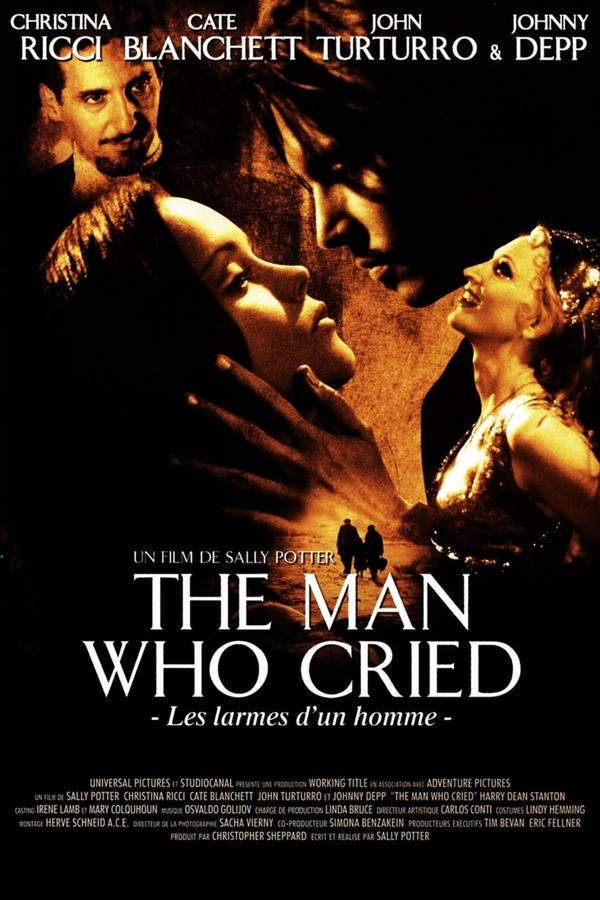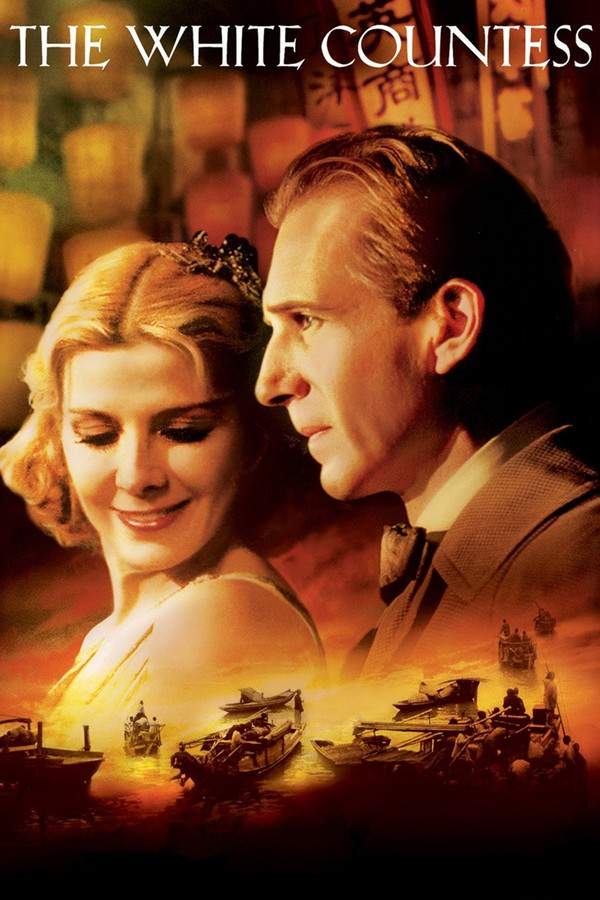
The Man Who Cried 2001
Directed by

Sally Potter
Made by

Universal Focus
Test your knowledge of The Man Who Cried with our quiz!
The Man Who Cried Plot Summary
Read the complete plot summary and ending explained for The Man Who Cried (2001). From turning points to emotional moments, uncover what really happened and why it matters.
Fegele Abramovich, played by Christina Ricci, is a young Russian Jew who experiences a heartbreaking separation from her father (Oleg Yankovsky) in 1927. As he ventures to America in search of a better life, he promises to send for Fegele and her grandmother. Before his departure, he tenderly sings “Je Crois Entendre Encore” from the Bizet opera Les pêcheurs de perles, a moment that lingers in her memory. Tragically, following her father’s departure, the village falls victim to a brutal pogrom, leading to its destruction. With the help of sympathetic neighbors, Fegele narrowly escapes and finds herself onboard a boat headed for Britain, clutching a photograph of her father and a coin gifted by her grandmother.
Upon arrival in England, she is renamed “Susan” by a local official and placed in the care of foster parents. Struggling to navigate her new environment, Susan faces ridicule from her peers, who, unaware of her circumstances, mockingly refer to her as a “gypsy.” Language barriers hinder her understanding, but a compassionate teacher, recognizing her talents, encourages Susan to sing and teach her English, allowing her to express herself.
As time goes by, Susan auditions for a coveted role in a singing dance troupe bound for Paris. There, she befriends an older Russian dancer named Lola (Cate Blanchett), and they form a bond living together as roommates. At a glamorous social event, the duo performs alongside a captivating horseman, Cesar (Johnny Depp), who instantly captivates Susan’s interest. After their exciting performance, they hear a beautiful tenor voice inside, which belongs to Dante (John Turturro), an Italian opera singer who also catches Lola’s eye. The relationship between Lola and Dante blossoms as she seeks to earn his affection, drawn in by his charm and success. Meanwhile, Susan finds herself being introduced to Cesar’s close-knit community, deepening her connection with him.
Trouble arises as Dante discovers Susan’s Jewish background when he stumbles upon her father’s photograph during a deceitful visit to her apartment after spending time with Lola. An elderly Jewish neighbor, Madame Goldstein (Miriam Karlin), warns Susan of the impending peril as Nazi threats loom ominously on the horizon. With the German invasion of France, a frantic exodus begins, as many, including Jews, attempt to escape the looming terror. The opera show, once vibrant with spectators, begins to empty, leaving only Susan and Dante among the performers. When Dante attempts to pursue Susan romantically, she firmly rejects him, igniting his ire against her heritage and her relationship with Cesar.
In a tense confrontation, it becomes clear that both personal and political tensions are spiraling out of control. Felix Perlman (Harry Dean Stanton), who manages the opera company, steps in to defend Susan, reminding Dante that, as an Italian in a precarious position in Paris, he too faces threats should Mussolini ally with the Nazis. As the atmosphere grows increasingly tense, Perlman decides to shut down the show, just as the Nazis breach the city limits the following day.
Reluctantly thrust back into the role of minstrel, Dante’s jealousy propels him to betray Susan to a German officer. Lola, realizing the danger surrounding Susan, urges her to leave Paris. With excitement, Lola arranges a passage on an ocean liner to escape to America, a plan that meets with cataclysmic events. On the night of their departure, tragedy strikes when the Nazis attack Cesar’s Romani village, killing a child, and making the need for Susan to flee all the more urgent. Despite her love for Cesar and her desire to stay and fight alongside him, he insists that her safety must come first.
As fate would have it, the ocean liner they board is tragically torpedoed during transit, claiming Lola’s life in the chaos. Susan miraculously survives and is brought to New York, where her search for her father commences. In her quest, she learns that he has altered his identity, abandoned his singing career, and built a new life out west, believing his family perished in the horrific attack on their village.
When Susan finally arrives in Hollywood, she confronts the reality of her father’s new life, including a new family and a terminal illness. Overcoming her feelings of abandonment, she walks past his new wife and children waiting in the hallway, making her way into his hospital room. As he recognizes her, his face lights up with joy. Filled with emotion, she sits beside him and sings “Je Crois Entendre Encore” in Yiddish, bringing tears to both of their eyes as they reconnect amidst the trials and tribulations of their tumultuous past.
The Man Who Cried Timeline
Follow the complete movie timeline of The Man Who Cried (2001) with every major event in chronological order. Great for understanding complex plots and story progression.
Separation from Father
In 1927, Fegele Abramovich is separated from her father as he leaves for America in search of a better life. Before leaving, he sings 'Je Crois Entendre Encore' from the opera *Les pêcheurs de perles*, a moment that remains etched in her memory.
Pogrom Destruction
After her father's departure, Fegele's village suffers a brutal pogrom, resulting in destruction and loss of life. She narrowly escapes with the help of sympathetic neighbors, clutching a photograph of her father and a coin from her grandmother.
Arrival in England
Fegele arrives in England, where she is renamed 'Susan' by a local official. Placed in the care of foster parents, Susan struggles to adjust to her new life while dealing with language barriers and the mockery of her peers.
Compassionate Teacher
Despite the difficulties she faces, a compassionate teacher recognizes Susan's singing talents. She encourages Susan to express herself through music and helps her learn English, gradually boosting her confidence.
Auditioning for a Troupe
As time passes, Susan auditions for a singing dance troupe headed to Paris. Her talent catches the attention of the troupe leaders, securing her a place among them and setting the stage for her new life.
Friendship with Lola
In Paris, Susan befriends an older Russian dancer named Lola. They develop a close bond as roommates, sharing their dreams and struggles in the vibrant atmosphere of their new surroundings.
Performance with Cesar
At a glamorous social event, Susan and Lola perform alongside a captivating horseman named Cesar. Their performance is well-received, and Susan begins to feel a connection to Cesar, who is charismatic and enigmatic.
Danger of Discovery
Trouble arises when Dante, an Italian opera singer, discovers Susan's Jewish background through a photograph of her father. Madame Goldstein, a neighbor, warns Susan of the increasing dangers as Nazi threats loom over them.
Growing Tensions
As the German invasion of France begins, Susan's situation grows increasingly precarious. The opera show audience dwindles, and tensions rise as Dante's jealousy drives him to confront Susan about her identity.
Betrayal by Dante
Feeling threatened, Dante betrays Susan to a German officer, heightening her risk of capture. Lola realizes the gravity of the situation and urges Susan to escape Paris before it's too late.
Tragic Departure
On the night of their planned departure to America, Nazis attack Cesar's Romani village, resulting in tragedy. Susan is torn between her love for Cesar and the urgent need to escape to safety.
Ocean Liner Disaster
In a devastating turn of events, the ocean liner that Susan and Lola board is torpedoed during their journey to America. While Susan survives, Lola is tragically lost in the chaos, leaving Susan heartbroken.
Search for Father
Arriving in New York, Susan embarks on a quest to find her father. Her search reveals that he has changed his identity, believing his family perished in the violence that shattered their lives.
Confronting the Past
Susan finally arrives in Hollywood and confronts the reality of her father's new life, including a new family. She musters the courage to face him in the hospital, setting the stage for a long-awaited reunion.
Emotional Reunion
As her father recognizes her, joy lights up his face amid tears. Susan sits beside him and sings 'Je Crois Entendre Encore' in Yiddish, reconnecting with her father and healing wounds from their traumatic past.
The Man Who Cried Characters
Explore all characters from The Man Who Cried (2001). Get detailed profiles with their roles, arcs, and key relationships explained.
Fegele Abramovich/Susan (Christina Ricci)
Fegele is a young Russian Jew whose journey through loss and adversity defines her character arc. Her resilience and determination to find her father showcase her strength, even when faced with harsh realities. As she navigates personal identity and societal expectations, her evolution into Susan embodies hope amidst despair.
Lola (Cate Blanchett)
Lola is an older Russian dancer whose vibrant personality brings warmth and companionship to Susan's life. She embodies loyalty and compassion, often prioritizing Susan's well-being during dangerous times. Lola's relationship with Dante adds complexity to her character, revealing her vulnerabilities despite her strong exterior.
Cesar (Johnny Depp)
Cesar is a captivating horseman who catches Susan's eye with his charm. His allure creates a romantic tension but is also complicated by the threats surrounding them. Despite his initial carefree demeanor, his concern for Susan's safety highlights his deeper feelings and complexities as a character.
Dante (John Turturro)
Dante is an Italian opera singer whose connection with Lola puts him at the center of an emotional conflict. His jealousy and later betrayal of Susan showcase the darker sides of passion and loyalty. As a character caught between love and the pressures of the time, Dante's choices underscore the film's themes of conflict and identity.
Felix Perlman (Harry Dean Stanton)
Felix Perlman serves as a protective figure within the opera company, defending Susan when tensions rise. His understanding of the precariousness of their situation adds depth to the story as he tries to maintain a semblance of normalcy in the face of chaos. Felix embodies the struggle for solidarity amidst growing danger.
Madame Goldstein (Miriam Karlin)
Madame Goldstein is an elderly Jewish neighbor who offers wisdom and warnings to Susan. Her role as a matriarchal figure emphasizes the importance of community and vigilance during turbulent times. Through her character, the film highlights the legacy of survival among Jewish families facing persecution.
The Man Who Cried Settings
Learn where and when The Man Who Cried (2001) takes place. Explore the film’s settings, era, and how they shape the narrative.
Time period
1927-1940s
The story unfolds from 1927, capturing the upheaval faced by Jewish communities during this volatile period in history. During the late 1930s, impending World War II created a climate of fear and uncertainty, as the Nazi regime began its aggressive expansion, leading many to flee their homes in search of safety.
Location
Russia, England, Paris, America
The movie takes place in various locations, starting in Russia, where Fegele's family experiences tragedy. She moves on to England, where she faces cultural challenges, followed by her journey to Paris, a city known for its vibrant arts scene and social dynamics. Finally, the narrative culminates in America, a land of hope and new beginnings.
The Man Who Cried Themes
Discover the main themes in The Man Who Cried (2001). Analyze the deeper meanings, emotional layers, and social commentary behind the film.
🎤
Identity
The theme of identity is central to Susan's journey, as she navigates her Jewish heritage in the face of adversity. Her transformation from Fegele to Susan symbolizes her struggle in finding acceptance in a world that marginalizes her roots. The tension arising from her background and the relationships she forms reflects the complexity of identity during times of turmoil.
💔
Separation
Separation is a poignant theme that resonates throughout the film. Fegele's initial separation from her father sets the stage for her later struggles with abandonment and loss. The film explores the emotional consequences of being torn from loved ones, particularly during the rise of persecution and war.
⚔️
Conflict
Conflict arises both personally and politically, reflecting the dire circumstances of the time. Susan faces societal conflicts, prejudice, and betrayal, while the backdrop of Nazi threats escalates the stakes. The interplay of personal relationships against a landscape of war emphasizes the difficult choices faced by individuals caught in such a chaotic world.

Coming soon on iOS and Android
The Plot Explained Mobile App
From blockbusters to hidden gems — dive into movie stories anytime, anywhere. Save your favorites, discover plots faster, and never miss a twist again.
Sign up to be the first to know when we launch. Your email stays private — always.
The Man Who Cried Spoiler-Free Summary
Discover the spoiler-free summary of The Man Who Cried (2001). Get a concise overview without any spoilers.
In 1927 a young Russian‑Jewish girl named Fegele is torn from her family by a violent pogrom. She flees across war‑torn Europe, finding refuge in England where officials give her a new name and a modest home. Amid a city still smelling of coal and tea, she discovers a prodigious voice that hints at a future far beyond the cramped attic rooms of her foster family. The bustling streets of London become a classroom of language, music, and the fragile hope of a child learning to sing her own story.
Fegele’s talent soon carries her to the glittering stages of Paris, a city alive with cabarets, avant‑garde art, and a kaleidoscope of expatriate performers. There she shares a modest apartment with a seasoned Russian dancer, Lola, whose world‑weary grace offers both mentorship and a glimpse into the larger tapestry of theatrical life. A charismatic Romani horseman, Cesar, drifts into the troupe, his magnetic presence adding a swirl of daring rhythm to the otherwise disciplined performances. Their interactions create a lively, sometimes tension‑filled, dynamic that underscores the film’s blend of romance, ambition, and the lingering shadow of displacement.
The atmosphere of pre‑war Paris is intoxicating yet fragile, suffused with jazz, whispered politics, and the undercurrent of an approaching darkness. As rumors of the Nazi advance ripple through the city’s artistic circles, Fegele feels the pull of a promise made to her father—a promise that an uncertain world may still hold a path back to family. The looming threat shapes the tone of the narrative, turning the opera house’s spotlight into a beacon of both hope and impending peril, and setting the stage for a daring journey across continents in search of a lost home.
Can’t find your movie? Request a summary here.
Movies with Similar Twists and Themes
Uncover films that echo the narrative beats, emotional arcs, or dramatic twists of the one you're exploring. These recommendations are handpicked based on story depth, thematic resonance, and spoiler-worthy moments — perfect for fans who crave more of the same intrigue.
Featured on this page

What's After the Movie?
Not sure whether to stay after the credits? Find out!
Explore Our Movie Platform
New Movie Releases (2026)
Famous Movie Actors
Top Film Production Studios
Movie Plot Summaries & Endings
Major Movie Awards & Winners
Best Concert Films & Music Documentaries
Movie Collections and Curated Lists
© 2026 What's After the Movie. All rights reserved.










